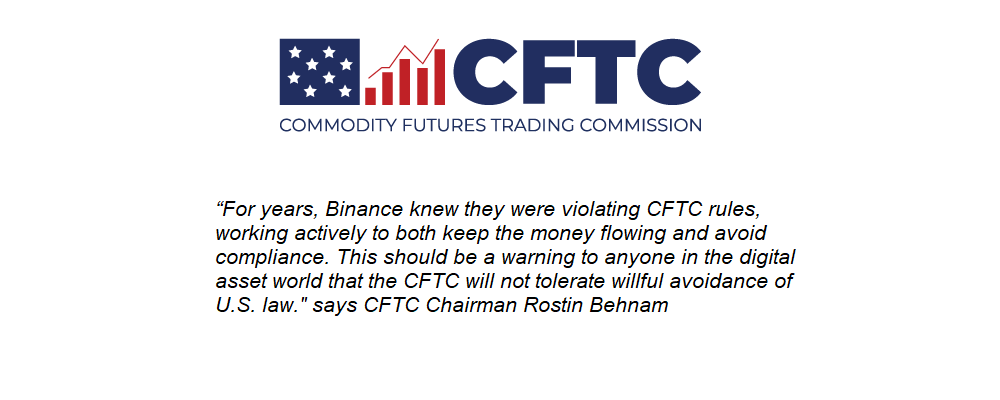The Commodity Futures Trading Commission charges Binance and its founder, Changpeng Zhao, with „willful evasion of federal law and operating an illegal digital asset derivatives exchange”.

Update – Changpeng Zhao’s response to the CFTC Complaint
Today, the CFTC filed an unexpected and disappointing civil complaint, despite our working cooperatively with the CFTC for over two years. Upon an initial review, the complaint appears to contain an incomplete recitation of facts, and we do not agree with the characterization of many of the issues alleged in the complaint. While we will only be able to give full responses in due time, we will address a few key points below.
Technology for Compliance & US Blocks. Binance.com has developed best-in-class technology to ensure compliance. Binance.com is the first global (non-US) exchange to implement a mandatory KYC program, and remains today to have one of the highest standards in KYC and AML. We block US users by nationality (KYC), IP (including commonly used VPN endpoints outside of the US), mobile carrier, device fingerprints, bank deposit and withdrawals, blockchain deposits and withdrawals, credit card bin numbers, and more.
We are aware of no other company using systems more comprehensive or more effective than Binance.
Cooperation and Transparency with Law Enforcement. Binance is committed to transparency and cooperation with regulators and law enforcement (LE) — in the US and globally. Binance currently has more than 750 people in our Compliance teams, many with prior law enforcement and regulatory agency backgrounds. To date, we have handled 55,000+ LE requests, and assisted US LE freeze/seize more than $125 million in funds in 2022 alone and $160 million in 2023 so far.
We intend to continue to respect and collaborate with US and other regulators around the world.
Registrations and Licenses. Binance.com holds the highest number of licenses/registrations globally, 16 and counting, and is well regarded by our user community.
Trading. Binance.com does not trade for profit or “manipulate” the market under any circumstances. Binance “trades” in a number of situations. Our revenues are in crypto. We do need to convert them from time-to-time to cover expenses in fiat or other crypto currencies. We have affiliates that provide liquidity for less liquid pairs. These affiliates are monitored specifically not to have large profits.
Personally, I have two accounts at Binance: one for Binance Card, one for my crypto holdings. I eat our own dog food and store my crypto on Binance.com. I also need to convert crypto from time-to-time to pay for my personal expenses or for the Card.
Binance.com has a 90 day no-day-trading rule for employees, meaning you are not allowed to sell a coin within 90 days of your most recent buy, or vice versa. This is to prevent any employees from actively trading. We also prohibit our employees from trading in Futures. Further, we have strict policies for anyone with access to private information, such as details of listings, Launchpad, etc. They are not allowed to buy or sell those coins.
I observe these policies myself strictly. I also never participated in Binance Launchpad, Earn, Margin, or Futures. I know the best use of my time is to build a solid platform that services our users.
At Binance, we look for amicable solutions to all problems. We are collaborative with regulators and government agencies all around the world. While we are not perfect, we hold ourselves to a high standard, often higher than what existing regulations require. And above all, we believe in doing the right thing by our users at all times. In this journey towards freedom of money, we do not expect everything to be easy. We do not shy away from challenges.
We thank you for your unwavering support!
CZ
###
The Commodity Futures Trading Commission alleged in federal court in Chicago that Binance and its CEO, who is known as CZ, routinely broke American derivatives rules as the firm grew to be the world’s largest trading platform. Binance should have registered with the agency years ago and continues to violate the CFTC’s rules, according to the regulator.
The Commodity Futures Trading Commission today announced it has filed a civil enforcement action in the U.S. District Court for the Northern District of Illinois charging Changpeng Zhao – Binance CEO – and three entities that operate the Binance platform with numerous violations of the Commodity Exchange Act (CEA) and CFTC regulations. The complaint also charges Samuel Lim, Binance’s former chief compliance officer, with aiding and abetting Binance’s violations.
The complaint charges that Binance Holdings Limited, Binance Holdings (IE) Limited, and Binance (Services) Holdings Limited (together, Binance) operate the Binance centralized digital asset trading platform along with numerous other corporate vehicles through an intentionally opaque common enterprise, with Zhao at the helm as Binance’s owner and chief executive officer. The defendants allegedly chose to knowingly disregard applicable provisions of the CEA while engaging in a calculated strategy of regulatory arbitrage to their commercial benefit.
In its continuing litigation against the defendants, the agency seeks disgorgement, civil monetary penalties, permanent trading and registration bans, and a permanent injunction against further violations of the CEA and CFTC regulations, as charged.
“Today’s enforcement action demonstrates that there is no location, or claimed lack of location, that will prevent the CFTC from protecting American investors. I have been clear that the CFTC will continue to use all of its authority to find and stop misconduct in the volatile and risky digital asset market,” said CFTC Chairman Rostin Behnam. “For years, Binance knew they were violating CFTC rules, working actively to both keep the money flowing and avoid compliance. This should be a warning to anyone in the digital asset world that the CFTC will not tolerate willful avoidance of U.S. law. I applaud the diligent and dedicated work of the CFTC’s Enforcement team in bringing this action, and for their hard work in addressing illegal operations in the digital asset space.”
“Defendants’ alleged willful evasion of U.S. law is at the core of the Commission’s complaint against Binance. The defendants’ own emails and chats reflect that Binance’s compliance efforts have been a sham and Binance deliberately chose – over and over – to place profits over following the law,” said Gretchen Lowe, CFTC’s Enforcement Division Principal Deputy Director and Chief Counsel. “Today’s enforcement action reflects that the CFTC and its Enforcement Division will pursue those digital asset platforms and individuals who flout and actively attempt to circumvent CFTC regulatory requirements. I thank the Enforcement team for their dedication and hard work in bringing this action.”
Case Background
According to the complaint, Binance has offered and executed commodity derivatives transactions to and for U.S. persons from July 2019 through the present. As alleged, Binance’s compliance program has been ineffective and, at Zhao’s direction, Binance has instructed its employees and customers to circumvent compliance controls in order to maximize corporate profits.
The complaint charges that for much of the relevant period, Binance did not require its customers to provide any identity-verifying information before trading on the platform, despite the legal duty that entities like Binance functioning as futures commission merchants (FCMs) collect such information, and failed to implement basic compliance procedures designed to prevent and detect terrorist financing and money laundering.
The complaint further alleges that even after Binance purported to restrict U.S. customers from trading on its platform, Binance instructed its customers – in particular its commercially valuable U.S.-based VIP customers – on the best methods for evading Binance’s compliance controls. In addition, the complaint charges Binance with acting as a designated contract market or swap execution facility based on its role in facilitating derivatives transactions without registering with the CFTC, as required.
The complaint also charges the entity defendants with failing to diligently supervise Binance’s activities as an FCM. Among the numerous supervisory failures detailed in the complaint is Binance’s instruction to employees to communicate with U.S.-based customers concerning control evasion through a messaging application that was set to automatically delete written communications. According to the complaint, the reason Binance used that communication method was to avoid leaving any evidence of their efforts to retain U.S.-based customers.
The complaint further charges the Binance, Zhao and Lim with willful evasion of the requirements of the CEA. As alleged, the defendants conducted certain activities outside the U.S. designed to avoid CFTC regulation, such as intentionally structuring their entities and transactions to avoid registration requirements and instructing U.S. customers as well as other customers as to how to evade Binance’s compliance controls.
As alleged, Zhao is liable for Binance’s violations based on his control over Binance and his long-running failure to act in good faith concerning Binance’s misconduct. According to the complaint, Zhao owned and controlled dozens of entities that operate the Binance platform as a common enterprise. Zhao is alleged to have been responsible for all major strategic decisions at Binance, including devising the secret plot to instruct U.S.-based VIP customers to evade Binance’s compliance controls and instructing Binance employees to ensure all communications about their control subversion took place over applications that facilitated the automatic destruction of evidence.
Lim, Binance’s CCO from 2018 through 2022, is charged with willfully aiding and abetting Binance’s violations through intentional conduct that undermined Binance’s compliance program. Lim is also charged with conducting activities to willfully evade or attempt to evade applicable provisions of the CEA, including promoting the use of “creative means” to assist customers in circumventing Binance’s compliance controls and implementing a corporate policy that instructed Binance’s U.S. customers to access the trading facility through a virtual private network to avoid Binance’s IP address-based controls or create “new” accounts through off-shore shell companies to evade Binance’s KYC-based controls.
_____________
Customers and other individuals can report suspicious activities or information, such as possible violations of commodity trading laws, to the Division of Enforcement via a toll-free hotline, file a tip or complaint online, or contact the CFTC Whistleblower Office at whistleblower.gov. Whistleblowers are eligible to receive between 10 and 30 percent of the monetary sanctions collected paid from the CFTC Customer Protection Fund financed through monetary sanctions paid to the CFTC by violators of the Commodity Exchange Act.
Dariusz Mazurkiewicz – CEO at BLIK Polish Payment Standard
Banking 4.0 – „how was the experience for you”
„To be honest I think that Sinaia, your conference, is much better then Davos.”
Many more interesting quotes in the video below:









